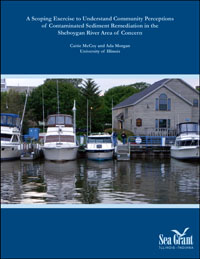 The Great Lakes Legacy Act project began with the development of a master plan and secured funding, with the goal of cleaning and restoring the lake’s natural habitats. By doing so, fish and wildlife populations can be restored, and the lake will be cleaner and safer for recreational use as well.
The Great Lakes Legacy Act project began with the development of a master plan and secured funding, with the goal of cleaning and restoring the lake’s natural habitats. By doing so, fish and wildlife populations can be restored, and the lake will be cleaner and safer for recreational use as well. Category:
Muskegon Lake cleanup project celebrates completion
May 23rd, 2012 by Irene Miles The Great Lakes Legacy Act project began with the development of a master plan and secured funding, with the goal of cleaning and restoring the lake’s natural habitats. By doing so, fish and wildlife populations can be restored, and the lake will be cleaner and safer for recreational use as well.
The Great Lakes Legacy Act project began with the development of a master plan and secured funding, with the goal of cleaning and restoring the lake’s natural habitats. By doing so, fish and wildlife populations can be restored, and the lake will be cleaner and safer for recreational use as well. Chicago green roofs help protect Lake Michigan
May 16th, 2012 by Irene Miles“A green roof acts like a natural sponge that absorbs stormwater and curtails runoff,” Aaron Durnbaugh, the university’s director of sustainability, explained in a statement. He went on to note that the university’s Chicago campus is located on the shores of Lake Michigan, which makes reduced runoff a real priority for protecting local water quality.”
Study examines community perceptions of river remediation
April 9th, 2012 by Irene MilesCommunication is a crucial part of any project, and especially one as significant as cleaning up an ecosystem that has been deemed an Area of Concern. One of those AOCs is the Sheboygan River, and Illinois-Indiana Sea Grant Environmental Social Scientist Caitie McCoy has been very involved in the remediation project, working with and reaching out to the communities that live near and rely on the river in a variety of ways.
To better understand community views and concerns about the river and the river cleanups going on this summer, several interviews were conducted with local stakeholders. The findings and resulting recommendations are presented in a qualitative study put together by Caitie and Ada Morgan, entitled “A Scoping Exercise to Understand Community Perceptions of Contaminated Sediment Remediation in the Sheboygan River Area of Concern.” You can download and read the entire study here.
Environmentally friendly boating keeps waterways blue and beautiful
April 4th, 2012 by Irene MilesOur friends at New Jersey Sea Grant have some great tips about safe, clean, environmentally friendly things that every boater can do to help the environment while preparing their watercraft for the season. And while there are some differences in conditions between the east coast and our Midwestern lakes and rivers, there are a number of steps that are universally good for protecting the outdoors.
Recent News
- IISG has a long history of supporting teachers through Great Lakes activities and resources
- Join Sea Grant to oversee program research and reporting
- Educators immerse in Great Lakes science aboard EPA research vessel
- Tomas Höök reflects on a legacy of leadership, collaboration and impact at IISG
- Freshwater jellyfish may increase in numbers as Illinois and Indiana waters continue to warm
IISG Instagram
The Center for Great Lakes Literacy has launched a beautifully redesigned website. The star of the show is the Resource Library!
Whether you`re teaching in a classroom, leading a community program, or just passionate about the Great Lakes, the new hub makes it easier than ever to find lesson plans, activities, videos, and stewardship ideas tailored to your needs.
🔗 Visit the link in bio to dive in!
#TeachingTuesday

This summer, 15 Great Lakes educators swapped lesson plans for life jackets as they boarded the Lake Guardian, the U.S. Environmental Protection Agency’s research vessel, and set sail on Lake Michigan. Through the Shipboard Science Immersion program, 5–12 grade formal and non-formal educators worked side by side with Great Lakes scientists for a week—an experience they say will ripple back to their classrooms for years to come.
Read more at the link in bio.

Looking for engaging, place-based literacy resources this school year? The Great Lakes: Our Freshwater Treasure by Barb Rosenstock is a beautifully illustrated dive into the geology, ecology, and history of our Great Lakes—perfect for sparking curiosity in learners of all ages.
📖 Learn more at the link in bio.
#GreatLakes #BookRecommendation #TeachingTuesdays
@brosenstock

Last month, Illinois and Indiana educators gathered for a two-day, professional learning workshop hosted by @duneslearning, @indianadnr, @thengrrec, and Illinois-Indiana Sea Grant to dive deep into water’s role in Earth’s systems
Using @projectwet’s newest guidebook, Water in Earth Systems, participants explored the unique ecosystems of @indianadunesnps and engaged in hands-on aquatic science activities—bringing Great Lakes learning to life in the classroom!
Thanks to all who joined us in connecting science, stewardship, and the Great Lakes!
Read More at the link in bio.

Categories
- Aquaculture
- Aquatic Invasive Species
- Buoys
- Climate Ready Communities
- Director's Blog
- Education
- Featured
- Fellowships
- Fisheries
- Funded Research
- Funding
- Great Lakes Cleanup
- Great Lakes Data
- Healthy Waters
- Internships
- Jobs
- K-12 Education
- News
- Photos
- Program
- Recreation & Tourism
- Resources
- Sea Grant Scholars
- Stormwater & Green Infrastructure
- Sustainable Community Planning
- The Helm
- Uncategorized
- Video
- Water Resource Economics


